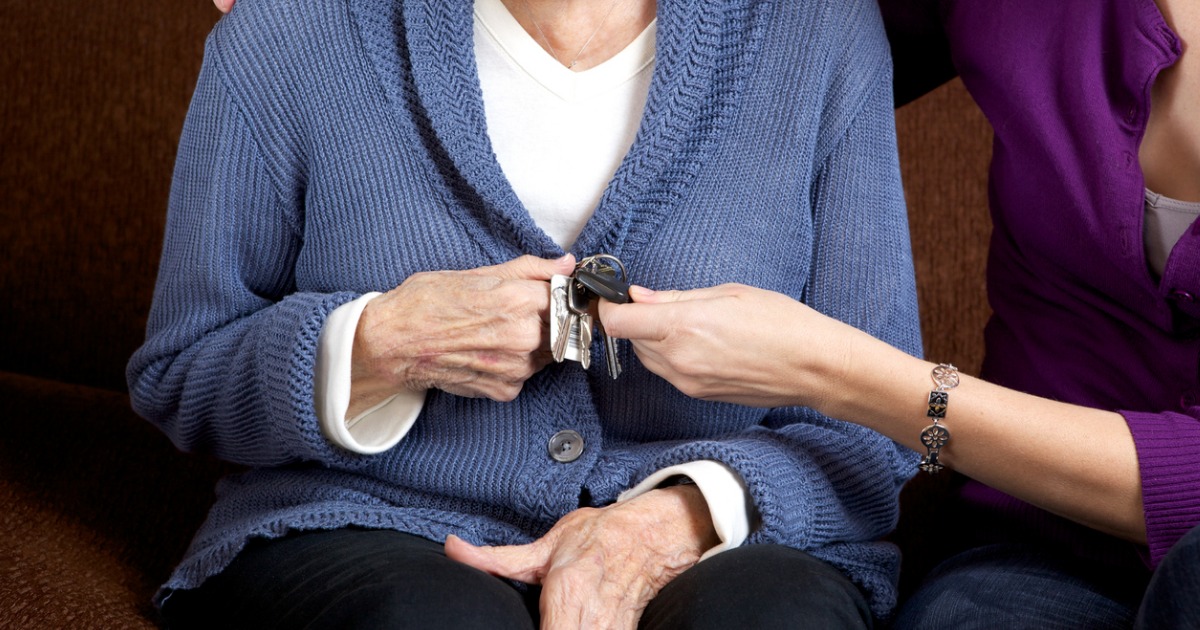Lately you’ve noticed some fresh dents on the bumpers of your parent’s car. The last time you rode with your dad he ran a red light, and frankly mom’s never been a good driver. Is it time for them to turn over their car keys?
Driving helps afford seniors the freedom and independence to age in place within the comfort of their own home, and that’s a goal that most of us have for our parents. But it’s a fact that elderly drivers are more likely to be involved in traffic accidents than others because of physical and cognitive changes like impaired vision, poor depth perception, and slower reaction times. Certain medications can also interfere with their driving abilities. When your aging parents have both reached a point where it’s simply not safe for them to operate a vehicle any longer, developing an effective strategy to convince them to give up the car keys is never easy. What follows are some tips on how to do so.
Signs that Seniors Need to Stop Driving
Watch for these indications that your mom and dad are having trouble driving:
- Several recent fender benders, accidents or car scrapes
- Driving too fast or too slow
- Difficulty moving their foot from the gas pedal to brake, or confusing the two
- Being pulled over by the police several times for driving infractions
- Not staying alert for pedestrians or other vehicles
- Other family members complain about their driving
- Running traffic lights or stop signs
- Getting lost in familiar areas
- Clipping curbs routinely
- Loss of self-confidence in their own driving abilities
- Frequent “close calls” on the road or in parking lots
- Other drivers honk at them often
When your aging parents begin exhibiting one or more of these signs on a regular basis, it’s time to have “the talk” with them about turning over their car keys.
Convincing Them to Turn Over Their Keys
Once you’ve determined that mom and dad shouldn’t be driving any longer, it’s wise to approach them before it’s too late. Here are some strategies to use:
- Gently but directly talk to them about the concerns that you and other family members have about their driving. Site specific examples of their unsafe driving that you observed recently, and how aging in general affects their driving.
- Share with your mom and dad recent news articles about senior-related accidents and how you don’t want that to happen to them.
- Have trusted persons outside the family talk to them about not driving any longer, like religious leaders, a family attorney, close friends, or their doctor.
- Volunteer to run errands for your parents, and to transport them to where they need to be. Ask other family members to do the same.
- Physically take away your parents’ car keys or hide them.
- Encourage them to take public transportation. Some cities and local volunteer groups even offer free bus services for seniors.
- Hire a private caregiver to transport them around.
At first, your parents will probably be defensive about giving up their car keys, as that could be perceived as a threat to their at-home independence. Reassure them that’s not the case, and that you and their other loved ones want them to stay at home for as long as possible. In most cases seniors end up making the right decision to stop driving.
We’ll Safely Transport Your Parents Around
Once your parents have agreed to turn in their car keys for good, they’ll still need to run errands, get to doctors’ appointments and social activities. There will be times when you or another family member won’t be able to provide your mom and dad with timely transportation. And that’s where a highly-trained caregiver from Seniors Prefer Homecare can step in and supply your parents with the safe and reliable transportation they deserve, while restoring your peace-of-mind.
Our in-home caregivers undergo thorough background checks including their driving records, and provide affordable transportation services that can be flexibly tailored to your parents’ specific needs. If your aging parents also require some assistance with their other daily living activities, Seniors Prefer Homecare delivers high-quality in-home caregiving for light housework, personal hygiene, cooking and companionship. For more information on the family-trusted, senior home care services we offer, please visit: www.seniorspreferhomecare.com now.

